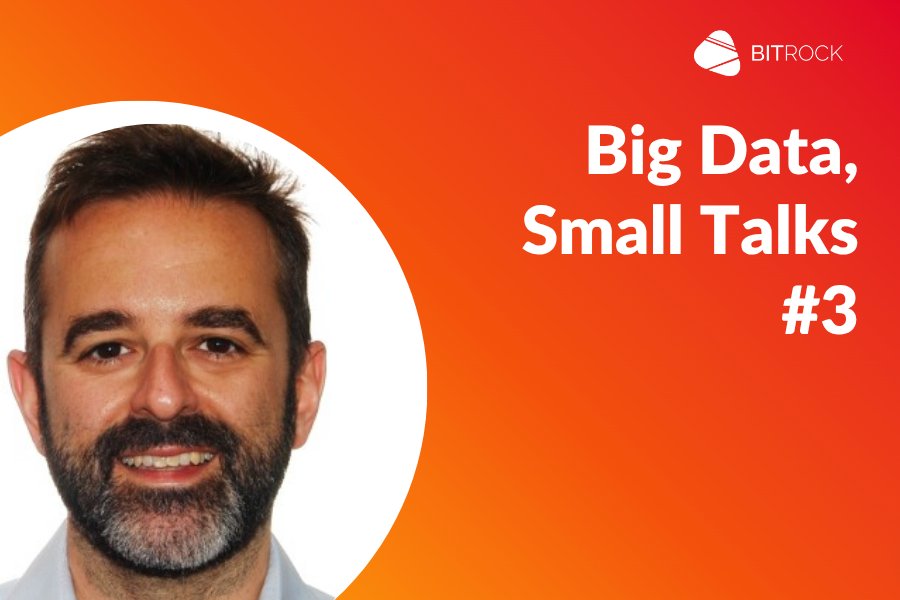For the third round of Big Data, Small Talks, Bitrock’s column that continues its journey into the fascinating and complex world of Data Engineering, bringing the voices and expertise of our professionals to the forefront.
Today, with Domenico Simone, Senior Data Engineer, we will explore the synergy between development teams and talk about how emerging technologies are shaping the landscape of Agentic AI.
Ready to learn more about our Bitrocker?
How do you collaborate with other teams to ensure that data is used effectively and consistently?
Collaboration between front-end and back-end teams is a virtuous circle that allows a holistic view of products. In this metaphor, back-end developers build the “roads” on which data travels, and my team ensures that the information travelling along those roads is reliable, complete and fast. Finally, the front-end team makes both the data and the results understandable and usable for the user. I believe that this holistic approach is particularly successful in the paradigm of Agentic AI applications, where different components must collaborate and exchange data in a fluid and consistent manner. In these cutting-edge contexts, data quality and integration become the glue that allows agents to make effective decisions and coordinate with each other, transforming efficiency into distributed intelligence.
Which emerging technology in the world of data do you think will have the greatest impact in the near future?
I believe that agentic applications are opening a new and decisive chapter in the data world: we are talking about systems composed of intelligent agents that collaborate with each other, exchange information and make decisions almost “autonomously”. In this evolving scenario, data becomes the common language that allows these agents to understand each other. To make this possible, technologies are emerging that make data more “alive” and dynamic. Event-driven architectures and data streaming frameworks such as Kafka or Redpanda allow information to be shared in real time between different components, keeping the system constantly up to date. At the same time, vector databases help agents to “remember” and reason better, linking similar concepts even when they are not identical — a bit like we do when we associate ideas by analogy. All these technologies point in the same direction: more lively, contextual and accessible data in real time, which becomes the fundamental glue of interaction between humans and artificial intelligence.
What is Bitrock’s Data Engineering team’s approach to integrating AI models into customer projects?
When we integrate AI into a project, we always start from a simple and pragmatic principle: technology must bring concrete value that goes beyond the buzzwords of the moment. Before writing a single line of code, we carefully evaluate the relationship between the costs of the solution and the real benefits for the customer — because not everything that is “AI” is automatically useful to the business. That said, in most cases, introducing AI proves to be a winning choice, as it allows us to automate complex processes, improve the quality of decisions and free up time for activities with greater added value. We then work iteratively, starting with a prototype to validate the idea, and only if the results are solid we move on to the scalability and full integration phase. This allows us to reduce risks and adapt the solution to the actual needs of the context. It is crucial to remember that AI is not a monolithic block but an ecosystem of components that collaborate, much like in agentic applications: in this sense, a well-designed data infrastructure is what allows these agents — and AI models — to work together effectively and transparently.
What is the most valuable non-technical skill for a Data Engineer according to you?
Without a doubt, curiosity. Data tells stories, but to discover them, you need to know how to ask the right questions and be willing to go beyond the surface. Being curious means not stopping at simply saying ‘it works,’ but asking ‘why does it work this way?’ and ‘how can we improve it?’ Curiosity is also what allows us to connect different worlds: it is the spark that makes us understand the customer’s context, intuit how an AI model can solve a real problem, or experiment with a new and unconventional approach. It is an intrinsic quality that makes work more stimulating and, ultimately, more human — even in a field increasingly dominated by artificial intelligence.
How is curiosity and experimentation encouraged within your team?
We constantly strive to keep curiosity alive, even during the most intense moments of our projects. When we succeed, we organise technical sharing sessions where everyone can talk about an idea, tool or technology they have discovered that could be useful to others. We don’t always manage to do this as regularly as we would like, but every time it happens, it becomes a valuable opportunity for exchange and inspiration. At the same time, we encourage an experimental and open approach, where it is legitimate to test, make mistakes and learn without fear of negative consequences. It is this spirit that allows us to stay up to date and find creative solutions, especially in a constantly evolving field such as AI. After all, every little exploration helps the team to grow — and to remain curious, a quality that directly translates into our clients’ projects.
With this third interview, we conclude our journey to discover Bitrock’s Data Engineering team, during which we have learned that our professionals are not only experts in technology, but also facilitators of a holistic view of the innovation strategy.
If the idea of transforming your data into a “common language” for innovation, or integrating AI applications with a pragmatic, value-driven approach, resonates with your business needs, then you’ve come to the right place. Contact Bitrock’s professionals for a consultation.

